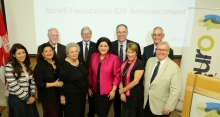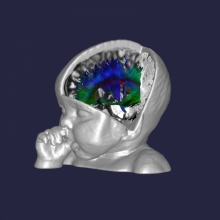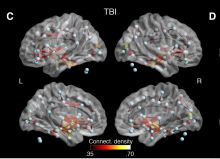Grants for Heather Durham, Stefano Stifani and Jay Ross total just over $2 million
Three MNI researchers have received grants from the ALS Society of Canada worth a total of more than $2 million.

Three MNI researchers have received grants from the ALS Society of Canada worth a total of more than $2 million.

Enjoyment of music is considered a subjective experience; what one person finds gratifying, another may find irritating. Music theorists have long emphasized that although musical taste is relative, our enjoyment of music, be it classical or heavy metal, arises, among other aspects, from structural features of music, such as chord or rhythm patterns that generate anticipation and expectancy.

The Azrieli Centre for Autism Research will foster innovations in therapy and a better understanding of Autism Spectrum Disorder.
A new research centre in Montreal will help lift the shroud of mystery surrounding autism spectrum disorder (ASD), and lead to the development of better diagnostic tools and more effective therapies for people with autism.

A night dedicated to the memory of those lost to brain cancer and in honour of those still fighting the disease will raise money for research that will lead to better treatments.

Whether it is dancing or just tapping one foot to the beat, we all experience how auditory signals like music can induce movement. Now new research suggests that motor signals in the brain actually sharpen sound perception, and this effect is increased when we move in rhythm with the sound.

Multiple events planned for this week will help educate the public about amyotrophic lateral sclerosis (ALS), a devastating disease that still has no cure.

Dr. Edith Hamel and Dr. Robert Zatorre have been elected Fellows of the Royal Society of Canada. Election to the academies of the Royal Society of Canada is the highest honour a scholar can achieve in the Arts, Humanities and Sciences.

A new partnership between The Neuro and F1000 will create a publishing platform for researchers that will speed the progress of neuroscience discovery.
The Montreal Neurological Institute and Hospital of McGill University (The Neuro) is partnering with F1000, a provider of support services for researchers, institutes and funders, to create a new open research publishing platform called MNI Open Research (https://mniopenresearch.org).

The origins of autism remain mysterious. What areas of the brain are involved, and when do the first signs appear? New findings published in Biological Psychiatry brings us closer to understanding the pathology of autism, and the point at which it begins to take shape in the human brain. Such knowledge will allow earlier interventions in the future and better outcomes for autistic children.

For people suffering from depression, a day without treatment can seem like a lifetime. A new study explains why the most commonly prescribed antidepressants can take as long as six weeks to have an effect. The findings could one day lead to more effective and faster acting drugs.

Practice might not always make perfect, but it’s essential for learning a sport or a musical instrument. It's also the basis of brain training, an approach that holds potential as a non-invasive therapy to overcome disabilities caused by neurological disease or trauma.
Research at the Montreal Neurological Institute and Hospital of McGill University (The Neuro) has shown just how adaptive the brain can be, knowledge that could one day be applied to recovery from conditions such as stroke.

Lawyers representing both sides in concussion lawsuits against sports leagues may eventually have a new tool at their disposal: a diagnostic signature that uses artificial intelligence to detect brain trauma years after it has occurred.

A generous donation by The Tenaquip Foundation will improve the quality of care available to ALS patients at The Neuro, and increase the rate at which researchers can evaluate new ALS drugs.

Patients with common widespread forms of cancer will enjoy longer life expectancy and reduced risk of recurrence thanks to a multimodal optical spectroscopy probe developed by Canadian researchers.

Scientists have known for some time that a memory is stored in the brain through changes in the strength of particular synapses, the structures that pass signals between neurons. However, how the change in strength persisted remained a mystery. Solving this mystery has important implications for remedying neurological and psychological disorders.